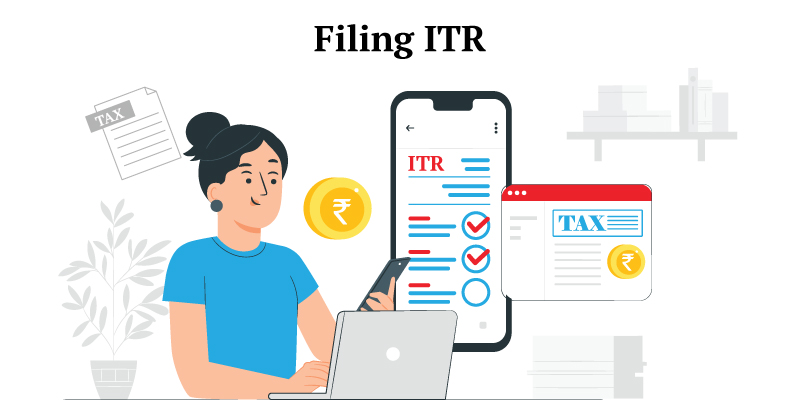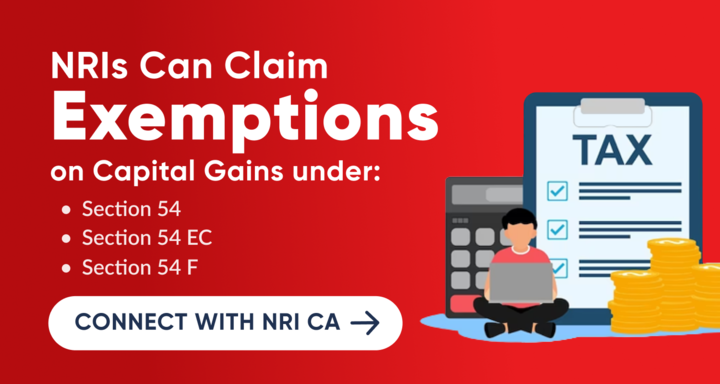As an NRI (Non-Resident Indian), understanding and filing your Income Tax Return (ITR) is crucial to comply with Indian tax laws and avoid any potential legal issues. The ITR filing for the Assessment Year (AY) 2023-24 has started. NRIs who have taxable income in India need to file their ITR for FY 2022-23 by 31st July 2023. In this blog, we will walk you through the essential steps and considerations for filing ITR for NRI (AY 2023-24).
Click on the button below to file your ITR in a hassle-free way.

ITR for NRI AY 2023-24
The last date for NRIs to file their Income Tax Return (ITR) is the same as for Resident Indians. NRIs must file their Income Tax Returns (ITR) for the financial year 2022-23 (Assessment Year 2023-24) before the specified deadline of 31st July 2023.
In the further section of this blog, we will discuss the steps required for ITR filing for NRIs along with the information related to ITR forms for NRIs.
Do NRIs have to File ITR in India?
Like resident Indians, NRIs are not required to file ITR if their total income in India for the FY 2022-23 is less than the basic exemption limit of Rs. 2,50,000.
For a detailed breakdown on whether you should file ITR as an NRI, check out the essential guide for FY 2024-25 here.
Taxable Income for NRIs
NRIs are not taxed on their foreign earnings but have to pay tax on the following income sources in India:
- Salary for services rendered in India.
- Income from residential property
- Capital gains or dividends from Indian shares.
- Any investments in India
- Income from other sources in India

ITR Filing for NRIs AY 2023-24
Here is a step-by-step guide on how NRIs can file their ITR for the Assessment Year (AY) 2023-24:
Determining Your Residential Status
Determine your residential status and select the appropriate ITR Form based on your income sources and category. NRIs are required to file returns using Form ITR-2 in all cases, except for business income. For NRIs with business income, Form ITR-3 is applicable. Form ITR-1 is not available for NRIs.
Reconciling Income and Taxes with Form 26AS
NRIs must report TDS credits and advance tax payments in Form 26AS. This will help them to avail benefits from tax treaties and also claim refunds for Tax Deducted at Source (TDS) deducted from their income. Individuals can get this Form from the e-filing tax portal.
Calculating Your Taxable Income
NRIs are liable to pay taxes in India on various types of income such as:
- Salary for services rendered in India.
- Rental income from property.
- Interest earned on NRO (Non-Residential Ordinary) accounts.
- Capital gains or dividends from Indian shares.
- Any investments in India.
Determining Tax Liability
Tax liability for NRIs is calculated based on the applicable NRI income tax slab rates. A basic exemption limit of Rs. 2.5 lakh is applicable to all NRIs before considering deductions or exemptions.
Claiming DTAA Benefits
Under the Double Tax Avoidance Agreement (DTAA), NRIs can avoid being taxed twice on the same income. With the help of this agreement, NRIs are exempt from tax deduction in one country or taxed at a reduced rate in the home country.
Verifying IT Returns
After filing the IT return form, it is crucial to verify the return within 30 days. NRIs can easily e-verify their IT returns from abroad using net banking, which does not require an OTP (One-Time Password).

NRI Income Tax Slab Rates AY 2023-24
Given below is the table for the latest Income Tax Slabs rates for the FY 2022-23 (AY 2023-24):
| Income Tax Slab | Income Tax Rate |
|---|---|
| Up to ₹2,50,000 | Nil |
| ₹2,50,001 – ₹5,00,000 | 5% above ₹2,50,000 |
| ₹5,00,001 – ₹10,00,000 | ₹12,500 + 20% above ₹5,00,000 |
| Above ₹10,00,000 | ₹1,12,500 + 30% above ₹10,00,000 |
Who is an NRI?
An Indian national who is not considered a resident of India for tax purposes is termed a Non-Resident Indian. To determine an individual’s residential status as a Non-Resident, the provisions under Section 6 of the Income Tax Act, 1961 come into play. The criteria for being treated as a Resident in India during any previous year are as follows:
- If the individual spends 182 days or more in India during the previous year, or
- If the individual spends 60 days or more in India during the previous year and a total of 365 days or more during the four years immediately preceding the previous year.
An individual who fails to meet both of the above conditions will be considered a Non-Resident for that specific previous year.

Contact SBNRI
Due to a complicated tax system, understanding tax laws can be confusing and NRIs may miss claiming deductions and other benefits or miss filing ITR on time. At SBNRI, we have tax experts to resolve any queries that NRIs may have related to NRI income tax. You can download SBNRI App to connect with our NRI Income Tax Experts and get end-to-end assistance related to NRI tax filing. SBNRI will also help you get a lower TDS Certificate.
You can also click on the button below to ask any questions. Visit our blog and YouTube Channel for more details.



